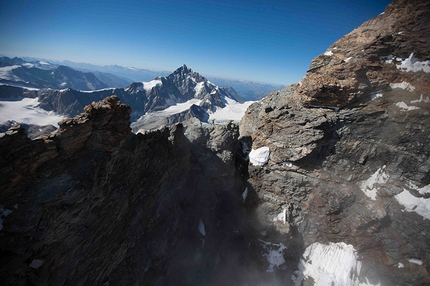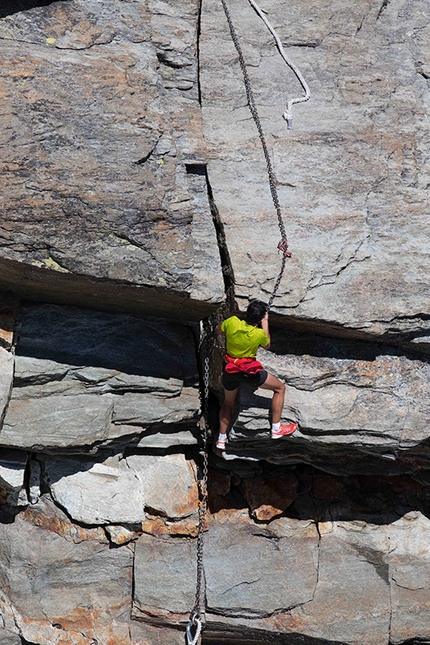Kilian Jornet Burgada: up and down the Matterhorn in less than three hours.

 1 / 7
1 / 7 Seb Montaz
Seb Montaz
The man who achieved this feat, Kilian Jornet, is totally besotted with the mountains and in all likelihood the strongest and most versatile endurance athlete of his generation. A young man who, aged only 25, has already won practically everything up for grabs in mountain running - from the vertical km to the longest ultra trails - and in ski mountaineering - from the vertical race to all great classics.
This supremacy was confirmed on Saturday, just three days after the record Matterhorn ascent, when Kilian was crowned Skyrunning World Champion by crossing the finishing line first in the 46km Matterhorn Ultraks race.
On 21 August 2013 Kilian surpassed himself once again by beating a record that had resisted since 1995, ever since the Italian Bruno Brunod stopped the clock on the same route after 3 hours, 14 minutes and 44 seconds. A quite extraordinary time. Here are some numbers about the new record that are bound to send shivers down the spine: during Kilian's 1 hour 56 minute ascent he averaged 1277m vertical height gain per hour, while his 56-minute descent average totaled 2645 m/hour.
Despite clothes and equipment reduced to a bare minimum, in line with his skyrunner tradition (running shoes, shorts, thermal t-shirt, windbreaker, gloves, sunglasses, bumbag, 3 energy gels), Kilian's climb has something distinctly mountaineering to it thanks to the route chosen and the spirit with which he embarked on this undertaking. This comes as no surprise, as in recent times Kilian has devoted more and more time to the vertical sphere, carrying out a series of significant ascents and steep skiing descents. These all testify his great love for the mountains, his desire to meticulously prepare himself for all types of terrain, as well as the will to experiment with those aspects which border between disciplines and which can therefore fertilise knowledge and open the doors to new possibilities.
The Matterhorn is perhaps the most technical stage of Summits of My Life, Kilian's ambitious and visionary project to climb the mountains of his dreams as quickly as possible. An eight-stage quest that began in June 2012 with the ski mountaineering traverse of the Mont Blanc massif and which has now reached its half-way point. The next leg this year will be Mount Elbrus, followed by Aconcagua and McKinley in 2014, before finishing off with Everest in 2015.
To those who turn their noses up at speed records, I believe it is important to have the strength to analyse what really lurks behind these beliefs. Speed, prior to being a defect, is a quality. Being fast in the mountains often means having the opportunity to make decisions and save oneself, as is stated clearly in a wonderful article written by another great youngster who has combined his snowboarder past with a mountaineering soul: Xavier De Le Rue. A fast mind can, furthermore, escape from all clichés, wisely judge risk and balance it out against ability and training. And above all, one can choose to go slowly, knowing simply and serenely that this choice is a viable option.
In any case, in order to stop people from being tempted into imprudently emulating this feat, it's important to remember that records like these require far more preparation and meticulous training than required by a normal ascent, as well as perfect weather and "extraordinary" safety measures. Kilian had spent the last two weeks at Cervinia: he'd tried the route eight times to study the crux section in details and he had waited for a day which, thanks to its particular conditions, has no equal throughout the rest of the year. Furthermore he wisely chose the precise start time (at three in the afternoon to reduce the number of frozen sections to a minimum) and along the route he'd set up adequate assistance in the form of mountain guides and Guardia di Finanza pros - seven guardian angels who kept him safe during his race. And it was Kilian who was the first to thank them by stating: "without their help I'd never have done it."
Kilian also banked on the expertise of an exceptional consultant, previous record holder Bruno Brunod. The Italian rooted for him right from the outset, predicted to the minute Kilian's time and also accompanied him down the final section of the route. Kilian remembered this excitedly "I was almost returning to Cervinia when Bruno joined me and told me I'd achieve the time he'd predicted: he seems to know me better than I do! This is the moment that will remain engraved in my memory. If I am what I am today, I owe it to people like him who have inspired me ever since I was a young boy."
These intense words and the palpable bond between men who achieved the same undertaking suggest the Wednesday's experience should be interpreted in a different light. All the ascent details and the actual performance are nothing but the tip of the iceberg. The most visible part of something far bigger, more intimate, hidden, previous. Something that must be searched for, investigated, that rarely ends up in the newspapers or on television. Something that is difficult, perhaps even impossible, to communicate through words only and that is worth far more than any record, number or time.
I have been lucky enough to have met several men who have achieved extraordinary things, and I have always been struck by the immense gap between their humanity and the superhero that tends to be construed in the minds of those who watch the records unfold and talk about them. This is a misperception, the result of a culture that emphasizes nothing but the outward appearance of things, the one that is easiest to understand and acclaim.
An achievement such as Kilian's rests on the invisible. On many days training, on hard work, determination to overcome limits, both personal and human. Of inner, mental battles to overcome the voice that encourages us to give up. It's based on the desire to go further, on the the honesty to listen to and unleash our dreams and vision, on the ability to translate them into something real and complete.
Something invisible that brings us closer together and unites us. Each and every one of us can put these strategies into practice on his daily basis and they will prove extremely precious, despite remaining remain invisible to most (but this does not matter). An undertaking such as Kilian's on the Matterhorn should give us strength and determination to never forget this opportunity, and motivate us to try and seize it.
To use Kilian's words "we are not runners nor alpinists, skiers or even athletes. We are people. " Those who wish to learn more about this great young man can do so by reading his book "Run or Die" . In doing so they'll discover that he also happens to be an effective and ironic narrator.
Giulio Caresio



 Copia link
Copia link







 See all photos
See all photos






















